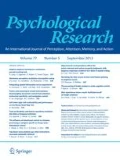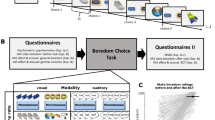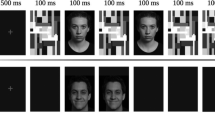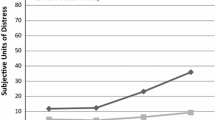Summary
Predictions derived from an information seeking, attribution model of false autonomic feedback were tested in an experiment using a 3 × 3 design. Male students (n = 61) viewed aversive slides accompanied by either increasing, constant, or no heart sounds. They were instructed either to attend to slides and sounds labelled extraneous, or to slides and sounds labelled as their own heart beats, or to try to explain their fictitious heart beats through slide features (attribution condition). Increase and constant feedback instigated equally intense information search (measured through self-determined viewing time and heart-rate deceleration) but increased feedback did not direct the search (measured through viewing time distribution and recall) more towards negative or less towards neutral features than did constant feedback. Increased feedback enhanced rated slide unpleasantness in the attention and attribution conditions whereas constant feedback decreased unpleasantness in the attribution condition only. Correlations were consistent with the hypothesis that attributions of fictitious autonomic reactions, but not information search and actual heart rate, mediate feedback effects on stimulus valences.
Similar content being viewed by others
References
Barefoot, J.D., Straub, R.B.: Opportunity for information search and the effect of false heart-rate feedback. J. Person. soc. Psychol. 17, 154–157 (1971)
Berlyne, D.E.: Structure and direction in thinking. New York: John Wiley & Sons 1965
Bierbrauer, G.A.: Attribution and perspective: Effects of time set and role on interpersonal inference. Unpublished doctoral dissertation, Stanford University, 1973
Bloemkolk, D., Defares, P., van Enckevort, G., van Gelderen, M.: Cognitive processing of information on varied physiological arousal. Europ. J. soc. Psychol. 1, 31–46 (1971)
Borkovec, T.D.: The effects of instructional suggestion and physiological cues on analogue fear. Behavior Therapy 4, 185–192 (1973)
Bramel, D., Bell, J.E., Margulis, S.T.: Attributing danger as a means of explaining one's fear. J. exp. soc. Psychol. 1, 267–281 (1965)
Campos, J.J., Johnson, H.J.: Affect, verbalization, and directional fractionation of autonomic responses. Psychophysiology, 3, 285–290 (1967)
Davison, G.C., Wilson, G.T.: Processes of fear-reduction in systematic desensitization: Cognitive and social reinforcement factors in humans. Behavior Therapy, 4, 1–21 (1973)
Detweiler, R.A., Zanna, M.P.: Physiological mediation of attitudinal responses. J. Person. soc. Psychol. 33, 107–116 (1976)
Gaupp, L.A., Stern, R.M., Galbraith, G.G.: False heart-rate feedback and reciprocal inhibition by aversion relief in the treatment of snake avoidance behavior. Behavior Therapy, 3, 7–20 (1972)
Girodo, M.: Film-induced arousal, information search, and the attribution process. J. Person. soc. Psychol. 25, 357–360 (1973)
Goldstein, D., Fink, D., Mettee, D.R.: Cognition of arousal and actual arousal as determinants of emotion. J. Person. soc. Psychol. 21, 41–51 (1972)
Graham, F., Clifton, R.: Heart-rate changes as a component of the orienting response. Psychol. Bull. 65, 305–320 (1966)
Hahn, W.W.: Attention and heart-rate: A critical appraisal of the hypothesis of Lacey and Lacey. Psychol. Bull. 79, 59–70 (1973)
Harris, V.A., Katkin, E.S.: Primary and secondary emotional behavior: An analysis of the role of autonomic feedback on affect, arousal, and attribution. Psychol. Bull. 82, 904–916 (1975)
Hirschmann, R.: Cross-modal effects of anticipatory bogus heart rate feedback in a negative emotional context. J. Person. soc. Psychol. 31, 13–19 (1975).
Libby, W.L., Lacey, B.C., Lacey, J.I.: Pupillary and cardiac activity during visual attention. Psychophysiology 10, 270–293 (1973)
Liebhart, E.H.: Information search and attribution. Cognitive processes mediating the effects of false automatic feedback. Europ. J. soc. Psychol. 7 (1977) (in press)
Misovich, S., Charis, P.C.: Information need, affect, and cognition of autonomic activity. J. exp. soc. Psychol. 10, 274–283 (1974)
Pawek, K.: What is man? München: Gruner und Jahr 1964
Pawek, K.: Woman. München: Gruner und Jahr 1968
Pawek K.: The path to paradise. München: Gruner und Jahr 1973
Regan, D.T., Totten, J.: Empathy and attribution: Turning observers into actors. J. Person. soc. Psychol. 32, 850–856 (1975)
Schachter, S.: The interaction of cognitive and physiological determinants of emotional state. In L. Berkowitz (Ed.), Advances in experimental social psychology (Vol. 1). New York: Academic Press 1964
Stern, R.M., Botto, R.W., Herrick, C.D.: Behavioral and physiological effects of false heart rate feedback: A replication and an extension. Psychophysiology, 9, 21–29 (1972)
Storms, M.D.: Videotape and the attribution process: Reversing actors' and observers' points of view. J. Person. soc. Psychol. 27, 165–175 (1973)
Valins, S.: Cognitive effects of false heart-rate feedback. J. Person. soc. Psychol. 4, 400–408 (1966)
Author information
Authors and Affiliations
Additional information
The author would like to thank Paul Wagemann, who ran part of the subjects, Alfred Holl, who helped to cope with equipment problems, and Günter Eisenhut, who assisted in data reduction and analysis.
Rights and permissions
About this article
Cite this article
Liebhart, E.H. Effects of false heart rate feedback and task instructions on information search, attributions, and stimulus ratings. Psychol. Res 39, 185–202 (1977). https://doi.org/10.1007/BF00309286
Received:
Issue Date:
DOI: https://doi.org/10.1007/BF00309286




